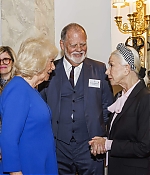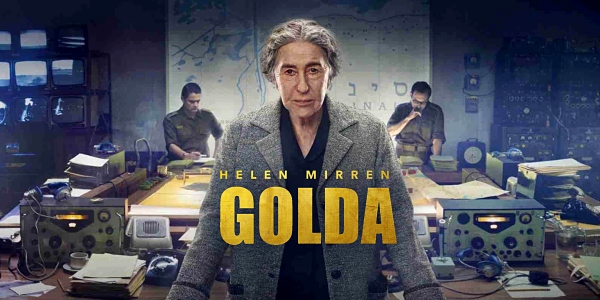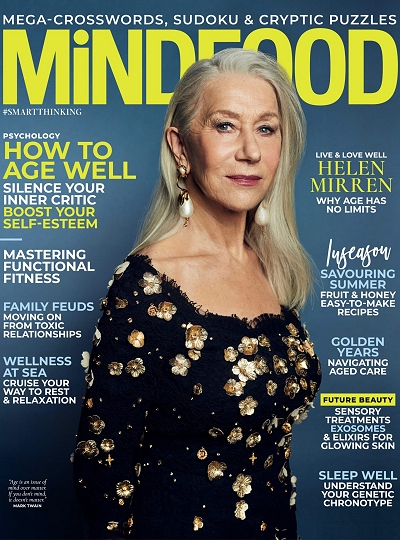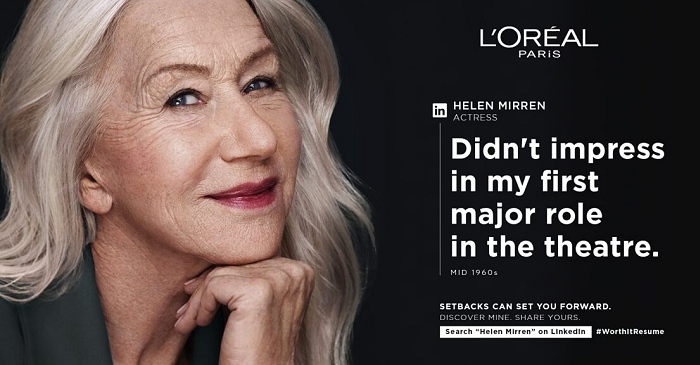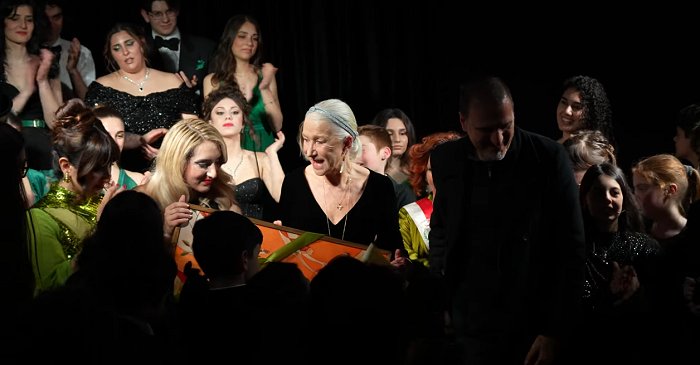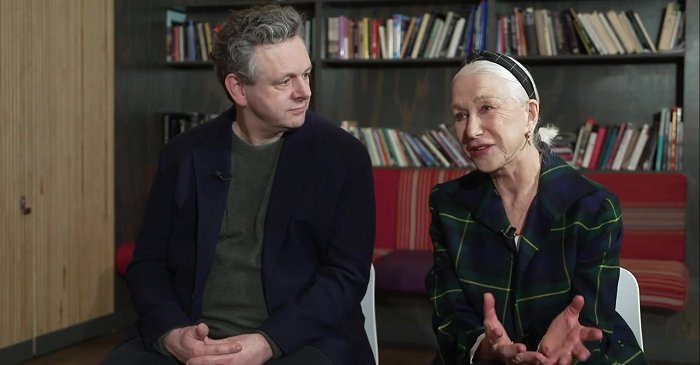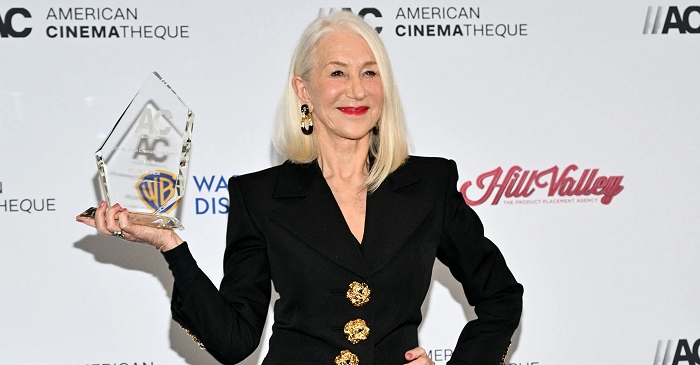
|
Welcome to The Helen Mirren Archives, your premiere web resource on the British actress. Best known for her performances with the Royal Shakespeare Company, "Prime
Suspect" and her Oscar-winning role in "The Queen", Helen Mirren is one of the world's most eminent actors today. This unofficial fansite provides you with all latest
news, photos and videos on her past and present projects. Enjoy your stay.
|
Celebrating
10 years
on the web
|
Helen Mirren says being naked on the screen gets easier with age, and next year she’s about to start work in a brothel. Chrissy Iley finds the perennial pin-up bent on mischief.
There is no doubt about it. Helen Mirren has a simmering sexual presence. Hot and cold, withdrawn and flirty, disciplined and out of control. When we meet in her hotel, she’s just finished eating eight croissants. She says it as if she’s rather impressed with herself. She says it without guilt, but kind of licking her lips. Mirren is starring in the children’s adventure movie Inkheart. The film is about what happens when you have the ability to make characters from books come to life. In the film, she plays an eccentric aunt who rides a motorcycle very fast, Lady Godiva hair swirling in the breeze. She says she took the part for that bike ride. She looked extremely comfortable on it. “Well, I didn’t have to learn because I already had a motorbike when I was in my early twenties. So I thought, I don’t care what else happens, I want to be on that motorbike again. I got it when I was in Stratford because I needed transport and I thought it would be cool, and also cheap, because I couldn’t afford a car. But it wasn’t cheap, because you have to buy all the clothes.”
You imagine Mirren in her leathers. Striking. “The major problem was, when you stop at a light: you can’t balance, so you have to put one foot down and hold the bike up.” She stands up and straddles as if riding a bike to demonstrate. She’s wearing a cotton suit in milky beige and a white T-shirt. As she bends down, the skirt stretches over her bottom and thigh. Extremely tight. “I wasn’t strong enough, so at every traffic light I would topple over. I had it for three or four months and thought, this is not working out. But on the movie set I could just go and stop, and someone would hold up the bike. It was lovely.” Since winning her Oscar for The Queen, she has worked steadily and variably, thus avoiding the Halle Berry curse of Oscar, where everything you take on flops and your career backtracks. She was twice nominated for Tonys on Broadway — for Turgenev’s A Month in the Country in 1995, and for Strindberg’s Dance of Death, with Sir Ian McKellan, in 2002. She is about to start filming The Tempest. And she’s been working with her husband, the director Taylor Hackford (An Officer and a Gentleman, and Ray). Lots of zigzagging the planet. I’ve just come from LA; she wants me to have a croissant too. “Because when you’re jet-lagged you feel entitled to absolutely anything, don’t you?” She asks a lot of questions of her own. Not as an aversion technique, which some interviewees employ rather than talk about themselves. She’s curious. Engaged, alert, curious. “My husband’s film is called Love Ranch. It’s a brothel in Nevada in the 1970s,” she says with a tiny but perceptible glint of naughtiness in her eye. Are you a madam? “Of course. I’m not one of the old girls,” she laughs. She could be — very many people would definitely want to have sex with her. “Funnily enough, the older prostitutes are the most popular, because the guys think they’re user-friendly. They’re comfortable with them, so they don’t feel intimidated. And guys who go to brothels are not the most successful guys in the world sexually, so that’s what they need. It’s all about not being intimidated,” she says, managing to seem intimidating and inviting all at once.
I don’t think she was born this much of a sexual being. I think she earned it with wit, confidence, and intelligence. Her face is so animated. You see her feeling everything. Sure, there are lines, but it’s not the lines you notice. It’s not the age, which is 63. You just think she’s hot — not hot “for her age”. She says it was fun to work with her husband, and then qualifies her statement. “It was lovely to go home at night and be with my husband,” she corrects. “Working with him, I have to say, wasn’t easy. My husband in work mode is not the easiest of people, although a lot of people adore working with him. But because I have the emotional connection with him, I would get upset if he was shouting — not at me, but at someone else, demanding something. I would be seeing it from their point of view. I would find myself rushing around trying to mop up after him.” Then she backtracks again and contradicts herself, as she is prone to do. “But I love the fact that he got the film together and he created a wonderful role for me. But husbands and wives don’t need to work together. We are professional people in our own worlds. There’s nothing I love more than going to my husband’s set and being his wife. But this, it mixes the roles up. It either gets too cosy, which is not a good thing, because it’s not very creative. Or it gets the opposite…” Which sounds like it was with you? “Yes. He didn’t make me cry, but he made me very cross.”
Perhaps the secret of their longevity is the fact that they hadn’t worked together since 1985, when they met on the set of White Knights. Mirren once told me it was because they came together late, as fully formed people. They eventually married in the Scottish Highlands in December 1997. “We came to each other grown-up, professionally formed. I was in my late thirties and I was just so aligned to him. We were generous to each other and loyal in terms of each other’s work.” Before that she had intoxicating love affairs with the photographer James Wedge, who liked to experiment with sexuality in his images, and the actors Nicol Williamson and Liam Neeson. The latter says he adored her because she taught him sophistication and how to eat prawns. There’s only a hint that she wasn’t always as well put together as she seems today. She says she cries easily when it’s with pleasure. She cried at Inkheart’s happy ending. “I always cry at peculiar times. For example, I weep openly if I see a parade, or people marching down the middle of the road, especially if they’re dressed up in their best. I think it’s because they’re trying so hard. Spelling Bees make me cry. Marching bands with drums, I’m in bits. The Olympics made me cry.” She puzzles: “Isn’t that strange?” What is also strange is, after the year she collected her Emmy for playing Detective Superintendent Jane Tennison in stripper shoes and a Marilyn dress, and her Golden Globe and Oscar for her emotionally hemmed-in performance in The Queen, she should want to follow it with a children’s film and play an aunt who doesn’t really like children. Is that like her? Does she like children? “I’ve never been hugely maternal, but I’ve always loved children as an aunt, a naughty aunt. I’m very happy to be able to give children back to their parents… Not that I’ve actually ever been alone with them.” She’s never wanted to have children of her own. She decided that when she was about 13 when she saw a film at her convent school of a woman giving birth.
“Out of our whole class there must have been more than me who were traumatised by it to this day. It was horrific and it gave me an absolute horror of childbirth. I suppose my local council must have had word down from the government that we had to have sex education. We had no mention of sex in my school, even in biology. So they herded us all together into a room with other girls the same age, and boys, and this dykey woman in short grey hair said, ‘What you are about to see is a miracle.’ And this film starts and it’s a midwives’ instructional film. There was no sound, just the camera going whirrrr, and words would come up at the bottom: Now prepare the rubber sheet. The lights came up at the end and every kid was white and sick and silent. The boys couldn’t look at the girls and the girls couldn’t look at the boys.” So there it was, a pivotal moment in the young Helen’s life. She was destined never to be a mother and never to mind about it. I wonder if this adds to her particular kind of sexual omnivorousness. My boxing trainer, who had been in the army, used to have her picture as a pin-up. He said: “Everybody in the army fancied her. We all had posters up, because the thing about her, even though she was older, she was never going to be your mum.” Most men are prone to a Mrs Robinson fantasy syndrome. They like older women because probably their first sexual awakening was from one — a teacher or a friend’s mother. Someone excitingly unreachable was just more loaded an attraction than the 12-year-old girl they sat next to in geography. I think men get excited by her experience. They hope to learn something and take it away. The take-it-away part is also very important to the appeal of the older woman. The older woman is not for ever; she’s transitory.
It’s in the moment. No strings, no biological imperative. It’s not long-term. There’s no pressure. Men don’t have to take a lead — they can follow. And also, she might be grateful. Mirren laughs at the thought of the boxing trainer’s devotion and says: “Oh, fabulous. And he’s absolutely right. I was never going to be anyone’s mum or grandmother. But I can dig that beautiful earth-mother thing, feeding the masses. I’m thinking of Nigella Lawson. Does she have children?” She does. “Do you know what I mean? She’s sort of gorgeously fertile. That’s sexy.” Mirren is quick to assert her sexuality isn’t in doubt: “I actually won my first Golden Globe for something called Losing Chase. Kyra Sedgwick and me fell in love with each other, and it was a lovely piece about women loving women. In my heart of hearts I love women more than I love men. I mean sexuality aside — I’m heterosexual.” She pauses to rewind. “I guess I’m heterosexual. I loved my friend I had at college because there was a sense of camaraderie and physical closeness that doesn’t have to be sexual.” I wonder.
Mirren is quite a tease. In her last interview she talked about how much she liked to take cocaine at parties. She only stopped using the drug when she realised that Klaus Barbie was living off the proceeds of others who made their money from cocaine in South America. Then she told another magazine that she’d been raped and never bothered to report it. Now she’s saying that she loves women “in general more than men”. But she has requested in the past that she be interviewed by a man because she gets on better with men. Was that true, then? “No, it’s more that I prefer male journalists because there’s a streak of female journalism — the bitches — who are mean-spirited and nasty because you are another woman and want to make you feel crap. It’s very upsetting. I’m more careful when I’m being interviewed by a woman because, from experience as well as reading articles about other women, I know there is a little stiletto knife hidden behind the back.” She’s laughing as she sizes me up. But she’s right. On the whole, women don’t like other women, because women are competitive with each other. She says: “In a rape case the courts in defence of a man would select as many women as they could for the jury, because women go against women. Whether in a deep-seated animalistic way, going back billions of years, or from a sense of tribal jealousy or just antagonism, I don’t know. But other women on a rape case would say she was asking for it. The only reason I can think of is that they’re sexually jealous.” We’ve gone from talk of loving women to hating women in just a few seconds. We talk about jurors in rape cases saying the victim “asked for it”. “Yes. That is terribly unfair. And that used to happen, didn’t it, in those days.” She says this with concern, perhaps even empathy.
She has said in the past that when she was forced to have sex against her will it was the lethal result of a combination of feminism — not wanting to be a victim — and innocence — not knowing how not to be a victim. She has said that it wasn’t about just saying no, because the man wouldn’t take no for an answer. When you see Mirren as vulnerable, it skews your judgment of her and you understand all those layers of confidence that have appeared over the years and how they could be torn away very quickly. Did she learn to be more confrontational? “No, I am not confrontational at all. I met a great guy, then another great guy, and had a series of fantastic relationships with nice men.” And that healed her. “Until that point I was thinking men were horrible; they were boring, boorish, vulgar, selfish and arrogant. Then I met a guy who was funny and lovely to me and I loved him. That was Ken, my first boyfriend. I learnt from wonderful men, wonderful relationships. They gave me support, made me feel good and made me laugh. Now I think men are absolutely great.” She’s quick to agree that her early antipathy towards men is because she went to an all-girls school. “Absolutely. I don’t blame it. But I was 18, suddenly in London, and I’d never been out past 11 at night before. I never thought, ‘I will never have sex till I get married,’ because I never wanted to get married. So sex was on the cards, but I wanted it to be incredibly romantic. I decided it had to be snowing.” And was it? “No, of course not. It was probably a disgusting rainy night, but I can’t remember.” Was it with some random boy? “Yes.” Did you ever see him again? “I don’t want to talk about that. Sorry.” Suddenly the air is thick with imaginary needles of pain. What did she learn from that experience? “I didn’t learn anything. I learn from the positive, not from the negative, but I do believe in getting on with it. Taking responsibility for yourself and not blaming other people is an incredibly important thing.”
This is key to Mirren’s mystical sexuality. She can be vulnerable, but she’s never going to be the victim. It is attractive. “But I’m not particularly competent, actually, in terms of answering phone calls, getting things done. I put on a good game. So to people like you I look incredibly self-confident and on top of everything.” You mean you are acting? “Yes, kind of.” You are acting in this interview? “Kind of. Sometimes I blow it. I’m certainly incredibly vulnerable as far as my career is concerned. I’m full of self-doubt.” But you’ve got an Oscar now. Surely that says: don’t doubt it. “It doesn’t stop you getting up and having to do it again.” Suddenly I notice her tattoo, a little naive star on her hand. She did it on impulse in an Indian reservation in Minnesota, many years ago.
“I just wanted the tattoo and I was a bit of a bohemian. I got it when women did not have tattoos. Now girls are covered in them, like Amy Winehouse.” The tattoo is not particularly pretty, but it’s a symbol of her going against the grain and a kind of fearlessness despite the self-doubt. A psychic once told her she wouldn’t have success till her fifties, which devastated her at the time. She was born in London and brought up in Southend-on-Sea. She was the daughter of a taxi driver whose father had come as an emissary from Russia to buy arms during the Russo-Japanese War in 1917. He was unable to return home because the Bolshevik revolution had started. The Bolsheviks confiscated the family’s estate and he was to be separated for ever from his seven sisters. Her Russian name, which she was born with, is Ilyena Vasilievna Mironov. She made an emotional pilgrimage last year to the family’s old estate in Russia and family in Gzhatsk near the city of Smolensk, 250 miles west of Moscow, and she’s always had a passion for Russian roles: she’s set to play the wife of Leo Tolstoy in the upcoming film The Last Station. At the start of her career she felt marginalised by being blonde and big-breasted. She felt dismissed. Perhaps that’s why she could play the frumpy Queen and the tired Tennison so comfortably. She was confident of her own sexiness and didn’t need roles to prop her sexuality, although she played plenty of sirens too. She’s been Cleopatra and Lady Macbeth, and naked a slew of times, notably in The Cook, the Thief, His Wife and Her Lover, and Calendar Girls. “As you get older, naked stuff gets easier. It’s more to do with the role than what men in the audience think. There’s a liberation about it.” You imagine her to be so confident about her body that she must be extremely attentive, with workouts and healthy regimes. “No, I’m very lazy. I go through phases of exercising. You know, if you start getting puffy when you go upstairs, I will force myself back into minimalistic exercise. I’m a great believer in the Canadian Air Force exercises because they only take 15 minutes.”
They must be working for her — the famous shots of her looking fit and slim in a red bikini flashed across newspaper pages round the world — but she dismisses them immediately. “I feel very lucky. I thought, ‘I wish I looked like I do in those pictures,’ because I don’t look like that at all. They’d just been taken at a great angle. The next day I started exercising because I thought, if I exercise, maybe I’ll look like that.” Have you ever felt the pressure to look a certain way for a part? “No, but I’ve done it to myself. I mean, actors are always on a diet. It’s lovely to get a great role. Then you think, ‘Oh, I’ve got to go on a diet.’ My whole life I’ve gone backwards and forwards the same 10lb. I can wear clothes from 20 years ago. At my thinnest I’m a couple of pounds under nine stone; at my fattest I’m a few pounds under 10 stone. I’ve gone through many diets that are also very boring. You stop eating, and that’s what makes you lose weight: not eating. But as you get older, losing weight doesn’t make your body look better, don’t you think?” We change the subject to Russell Brand, the latest younger boy to talk about how much he fancies her. “I don’t know if I fancy him. I haven’t met him yet. I’ll decide when I do. Talent is sexy. I love that alertness. I think Frank Skinner has it, and Jonathan Ross has it, and they are a little bit radical. I love those guys, and Russell Brand is definitely one of them.” So she concedes she might fancy him — this was before the radio prank-call scandal. All the men in her life have had one link. “They have all loved boxing. So through various men I have watched a lot of boxing. I do love the human drama of it.” When she’s not talking about working with Hackford, she talks softly about him. She talks about building things, like their flat in New York and “the ruin we are renovating in Italy”. “It’s going to take up all of our spare time until we are too old and too poor to live in it… But it’s incredible fun.”
In Inkheart some of the characters who have escaped from books have the book written all over them. If she had to have a book written all over her, what would it be? “I would have verses from The Song of Solomon, which is so beautiful. I would want beautiful things written on me that people could read and go ‘wow’.” She beams mesmerisingly. As I get up to go, she stops me and says, “And thank you for the view.” I blush. I was jet-lagged, I had no clean underwear, so I’d gone without. I didn’t think she’d notice. But she did. And she laughs, the minx.
Helen Mirren’s latest film, Inkheart, is released in the UK on December 12

